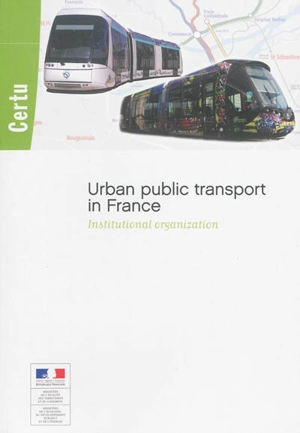
Urban public transport in France : institutional organization
Centre d'études sur les réseaux, les transports, l'urbanisme et les constructions publiques (France)
Versailles, Lyon 2ᵉ, Lyon 6ᵉ...
Ce que dit l'éditeurAround the world, as the demographic weight of urban areas increases, the need to provide all residents with efficient, low-energy public transport has become a major political issue. France has experienced a surge in urban public transport that began in the 1970s. First with the creation of metro lines in the largest cities, then with the launch of many modern tram networks in the Paris region and in medium-sized cities, and, more recently, with the creation of Bus Rapid Transit (BRT) lines when heavy modes were not justified. To support these development efforts and the use of urban public transport by citizens, an institutional and financial framework has been put in place by governments and constantly improved. The aim of this brochure is to present the organization of urban public transport in France in all its diversity, including ten or so monographs illustrating some original aspects of the practices and know-how of local authorities' (the organizing authorities) and large French passenger transport groups. We hope that this brochure will shed light on the French system and thereby contribute to sharing experiences in the field of urban transport. |
RésuméPrésentation de l'organisation des transports publics urbains en France, ainsi que les pratiques et le savoir-faire des collectivités territoriales et des grands groupes français de transport de voyageurs. ©Electre 2025 |
Caractéristiques Auteur(s) Éditeur(s) Date de parution
13 août 2013
Rayon
Commerce
EAN
9782111310520
Nombre de pages
131
pages
Reliure
Broché
Dimensions
30.0
cm x
21.0
cm x
cm
Poids
528
g
|

















